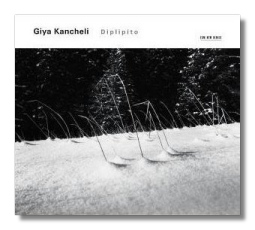
The Internet's Premier Classical Music Source
Related Links
- Kancheli Reviews
- Latest Reviews
- More Reviews
-
By Composer
-
Collections
DVD & Blu-ray
Books
Concert Reviews
Articles/Interviews
Software
Audio
Search Amazon
Recommended Links
Site News
 CD Review
CD Review
Giya Kancheli

- Diplipito
- Valse Boston
Dennis Russell Davies, piano
Derek Lee Ragin, countertenor
Thomas Demenga, cello
Stuttgart Chamber Orchestra/Dennis Russell Davies
ECM New Series 1773 472082-2 DDD 57:07
Born and later self-exiled from the former Soviet republic of Georgia, Giya Kancheli (b. 1935) has spent the last thirteen years using music to understand – and to help others to understand – what it means to be an exile. With each new work, this quest has taken on almost obsessive characteristics. Kancheli cuts his music from the same bolt of cloth each time, and although he may piece it together and trim it in different ways, there's no mistaking Kancheli's mature compositions for anyone else's. The other side of the coin is that the casual listener might understandably confuse one of Kancheli's works for another, were it not for differences in scoring. This composer has found his row, and he hoes it with utter dedication and single-mindedness.
Both of these works are a little more than 28 minutes in length. Valse Boston (1996) is scored for piano and orchestra, and is dedicated "to my wife with whom I've never danced." Diplipito (1997) is scored for cello, countertenor, and orchestra. (Bongos play a prominent role as the work progresses.) The score is inscribed with a quote by Joseph Brodsky: "My work of silence, my mute creation…." What "diplipito" means is unclear, but the composer offers a clue by adding the phrase "meaningless words from a Georgian epic" to the score.
The typical Kancheli score pits the ineffable against the intractable, and these two scores are no exception. Much of the time the music moves slowly, as if wandering blindly and tentatively through a barren landscape. This certainly describes the beginning of Diplipito. As the work progresses, however, the music becomes animated, but it is pointillistic animation – a flicker here and a glimmer there. With the bongos – a reference to the little darbouka drums of Kancheli's homeland – a suggestion of a folk dance is raised, but then denied very soon after. Diplipito finally comes to an inconclusive end having moved from one disquietingly insubstantial locale to another insubstantial locale – albeit a different one. Nothing has been solved; there is no "closure," yet the listener paradoxically is satisfied in the middle of dissatisfaction.
The traditional "valse Boston" or "Boston Waltz" is a rather indolent and fleshy variant of the Viennese dance – not at all what one would associate with prim New Englanders! One should not expect, of course, that Kancheli would compose schmaltz in three-four time. What we have here might be thought of as the inverse of Ravel's La valse. Ravel depicted a culture spinning out on control with uncontrolled kinetic energy. In Kancheli's work, perhaps the conflagration already has come and gone. The predominant mood is one of stasis, of immobility. There are signs of protest and of life however, and the strings rage venomously in an apparent attempt to move the music forward. And, over the course of 28 minutes, it does move forward, albeit in a most roundabout and "Kancheli-like" manner. Progress? To me it's subjective. Listeners who need a linear story to be told might be frustrated by Kancheli's music, but those who can accept a less traditional narrative might be fascinated by its haunting vapors.
The recordings were made in January 2001 (why the delay?) in Stuttgart, and in the presence of the composer. Once again, I feel that the last word has been said – a strange observation in music as open-ended as this.
Copyright © 2004, Raymond Tuttle


















